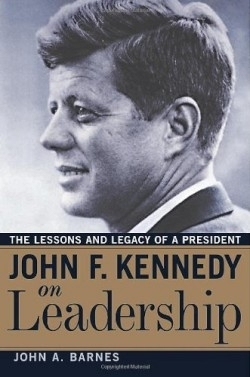John F. Kennedy on Leadership
More than forty years after his death, Kennedy remains an icon of charming and effective leadership. Although young and relatively inexperienced when elected, JFK gave the impression that he was born with the skills that took him to the most powerful office in the nation. It’s true that he was the son of a wealthy and ambitious father who provided him with a solid education, travel, and opportunities beyond the reach of ordinary Americans. However, the author points out that much of the JFK persona was carefully cultivated, and that today’s leaders can also acquire these qualities. To that end, Barnes has written a manual that is part history, part biography, and part how-to. The combination is both amusing and informative.
Barnes, also the author of Ulysses S. Grant on Leadership, has worked as a reporter for The New York Post, The Washington Times, and The Detroit News, and is a veteran TV commentator and corporate communications executive. Here, he lays out ten elements of leadership that are crucial in business: vision, avoiding the status quo, resilience, charisma, communication, speechwriting, learning, team building, decision making, and crisis management. Then, reflecting on JKF anecdotes, he discusses how Kennedy improved upon what was natural and acquired what was not. At the end of each chapter, Barnes highlights tenets for modern managers to ponder, using Kennedy as an example.
Reading such a structured book has its ups and downs. The reader can feel rebellious by the third or fourth chapter However, JFK’s ability to amuse comes through, even when filtered through time and a management book. His humor is fresh, especially his response to a female reporter who demanded to know what the administration had done for women. Looking sheepish, Kennedy confessed that he was sure they hadn’t done enough. His approach to speechmaking remains memorable and moving. His modernistic wagon wheel approach to leadership—providing aides with close access and the president with information—was a creative contrast to Eisenhower’s military-style line-of-command method.
Finally, Kennedy was a man who appreciated having choices, as illustrated by his reaction to the single military plan for a massive response to a nuclear attack prepared by the Joint Chiefs of Staff. Barnes uses these examples to elucidate his points about leadership.
Kennedy’s rebellious nature gave him the courage to face down institutional resistance successfully. He did this by creating his own structure when the existing one proved too unwieldy, surrounding himself with talent, and learning what he needed to know to make solid decisions. He benefited from both his mistakes and his successes; and he was willing to put in the time and effort that each task required. None of these tenets are new, but they still have the power to provoke thought in potential leaders.
Reviewed by
Joyce Faulkner
Disclosure: This article is not an endorsement, but a review. The publisher of this book provided free copies of the book to have their book reviewed by a professional reviewer. No fee was paid by the publisher for this review. Foreword Reviews only recommends books that we love. Foreword Magazine, Inc. is disclosing this in accordance with the Federal Trade Commission’s 16 CFR, Part 255.

